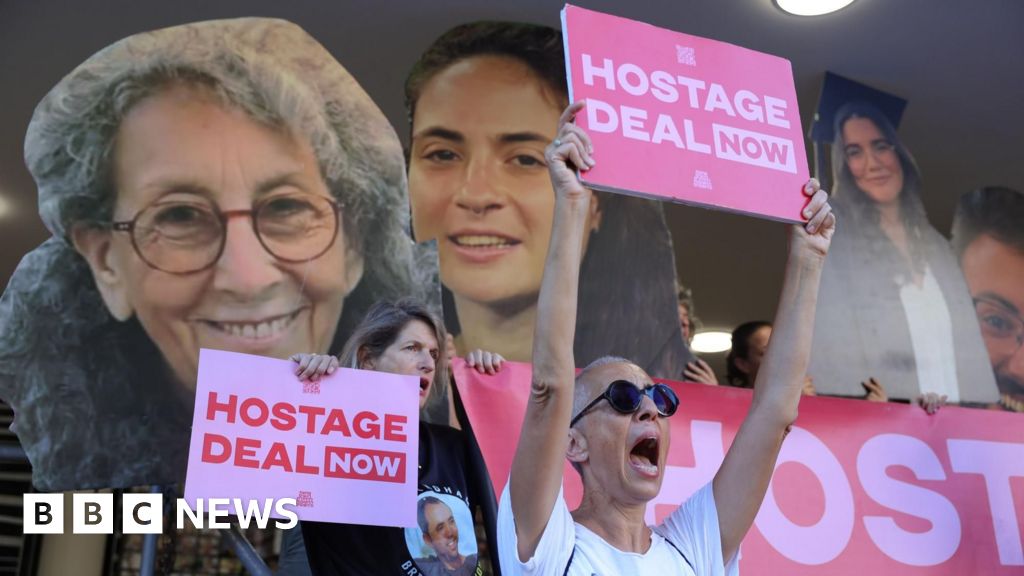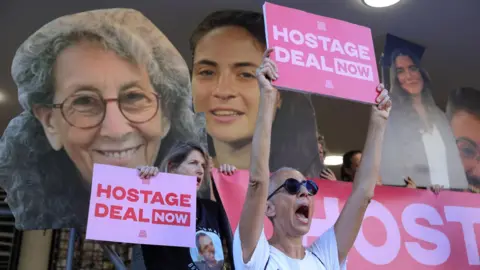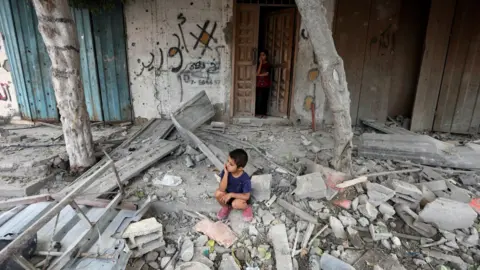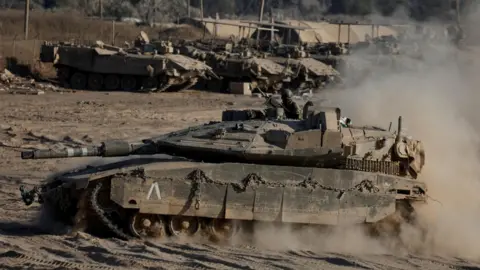
 EPA
EPAThe US says there has been a “promising start” to the new round of talks in Doha on a ceasefire and hostage release deal in the Gaza Strip, as the number of Palestinians reported killed in the war between Israel and Hamas surpassed 40,000.
An agreement is seen as key to stopping the 10-month conflict spiralling into an all-out regional war involving Iran, but expectations of a breakthrough are low.
White House spokesman John Kirby said “there remains a lot of work to do” to resolve gaps in the implementation of the framework agreement.
Hamas has said it will not participate in the indirect negotiations in Doha for now, although mediators are said to be relaying messages to the armed group’s officials based there.
It has called for a roadmap based on a proposal outlined by the US president and has accused Israel’s prime minister of adding new conditions, which he has denied.
Israeli media report that the country’s negotiating team has been given a slightly expanded mandate, while the relatives of hostages still held in Gaza are calling this the “last chance” to get some of them out alive.
The mediators face a number of potential sticking points, including control of land along Gaza’s border with Egypt and the return of displaced Palestinian civilians to northern Gaza.
The talks were suspended after Hamas’s political leader and chief negotiator, Ismail Haniyeh, was assassinated in Tehran at the end of July. Iran has vowed to retaliate against Israel, which has neither confirmed nor denied involvement, raising fears of a wider escalation.
The Israeli military launched a campaign in Gaza to destroy Hamas in response to an unprecedented attack on southern Israel on 7 October, during which about 1,200 people were killed and 251 others were taken hostage.
Gaza’s Hamas-run health ministry said on Thursday that at least 40,005 people had been killed in the territory since then, which the UN human rights chief described as a “grim milestone for the world”.
The figure, which does not make a distinction between combatants and civilians, is often disputed by the Israeli government but is broadly accepted by UN agencies.
The Israeli military said it had “eliminated over 17,000 terrorists”. It has also reported that 330 of its troops have been killed since the ground invasion began.
Israel’s delegation to the Doha talks reportedly included the directors of its Mossad foreign intelligence agency and Shin Bet domestic security service, David Barnier and Ronen Bar, as well as the Israeli military’s hostages chief, Nitzan Alon.
CIA director William Burns joined them, along with Qatari Prime Minister Mohammed bin Abdul Rahman Al Thani and Egyptian intelligence chief Abbas Kamel.
Qatari and Egyptian officials were also “mediating with Hamas” as part of the process, according to the US state department.
After the start of the discussions on Thursday, White House National Security Council spokesman John Kirby told reporters that they were likely to continue on Friday because of the complexity of the agreement.
Mr Kirby stressed that they were not having a debate over the broad framework of the deal.
“We’re at a point where it’s generally accepted. Where the gaps are in the execution of the deal, the individual muscle-movements that go with putting the deal in place,” he explained, without providing any details.
He added: “The remaining obstacles can be overcome, and we must bring this process to a close.”
 Reuters
ReutersThe first phase of the proposed deal outlined by US President Joe Biden at the end of May would include a “full and complete ceasefire” lasting six weeks, the withdrawal of Israeli forces from all populated areas of Gaza, and the exchange of some of the hostages – including women, the elderly and the sick or wounded – for Palestinian prisoners held in Israel.
The second phase would involve the release of all other living hostages and a “permanent end to hostilities”. The third would see the start of a major reconstruction plan for Gaza and the return of dead hostages’ remains
A senior official in Hamas – which is proscribed as a terrorist organisation by Israel, the UK and other countries – told the BBC on Wednesday that it would not attend the Doha talks, even though its political leadership is almost entirely based in the Qatari capital.
He claimed that Israel had “added new conditions and reneged on its previous agreement”, including demanding that it maintain full control over the Philadelphi corridor, a narrow strip of land running along Gaza’s southern border with Egypt, and that displaced people returning to northern Gaza be screened to ensure they are unarmed civilians.
Israeli Prime Minister Benjamin Netanyahu’s office issued a statement on Tuesday saying the claim that he had added new conditions was “false”, describing them instead as “essential clarifications to help implement” the initial proposal.
 Reuters
Reuters“Enough is enough, we want to get back to our homes in Gaza City. Every hour, a family is getting killed or a house getting bombed,” Aya, a displaced Palestinian woman sheltering in Deir al-Balah, told Reuters news agency. “We are hopeful this time. Either it’s this time or never I am afraid.”
The families of the remaining Israeli hostages also believe time is running out, and many took part in a march through Tel Aviv at which they chanted “seal the deal”.
It came as the spokesman of Hamas’s military wing released a statement providing further details about how he said an Israeli male hostage had been shot and killed by a Hamas guard. Abu Ubaida said the guard had “acted in a retaliatory manner, against instructions, after he received information that his two children were martyred” by Israeli forces.
The Israeli military said in response to the group’s initial statement about the killing on Monday that it did not have any information that allowed it to confirm or deny the claim.
Hamas also posted on Thursday a photo showing the body of another man, who it said had been killed in “an unfortunate incident”.
The Israeli military said the image showed “a hostage who was murdered and whose body was recovered” by troops in November.
The Hostages and Missing Families Forum identified him as Ofir Tzarfati and cited his mother, Richelle, as saying: “What is important is that the delegation succeeds and does everything to come back with a deal. Everyone needs to come home, now.”
In addition to halting a war and freeing hostages, the US and others see a ceasefire deal as a way to deter Iran from retaliating against Israel for the assassination of Ismail Haniyeh, who has been succeeded by Hamas leader in Gaza, Yahya Sinwar, one of the masterminds of the 7 October attack.
The Iran-backed Lebanese Hezbollah movement has also vowed to respond to the killing of a senior commander in an Israeli air strike in Beirut. The Israeli military blamed the latter for a rocket attack that killed 12 children in the Israeli-occupied Golan Heights.
Israel has warned Iran that it would “exact a heavy price for any aggression”, while Iran has insisted “a punitive response to an aggressor is a legal right”.
Mr Kirby said the US and its allies had to take seriously the “rhetoric coming out of Tehran”.
“I can’t sit here and tell you for sure that that there’s been a decision to change their mind,” he said. “A few days ago, we had information… that an attack could come with little or no warning, and certainly could come in coming days, and we have to be ready for it.”

